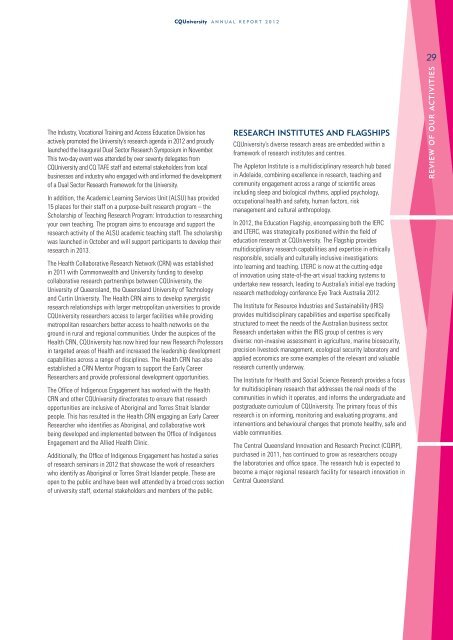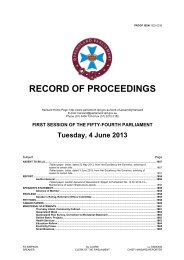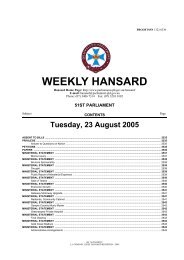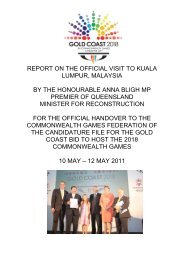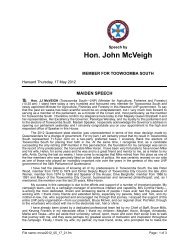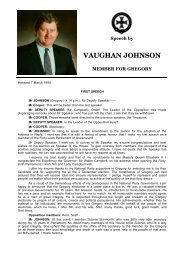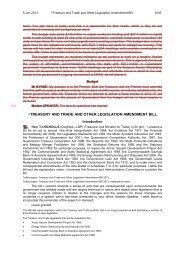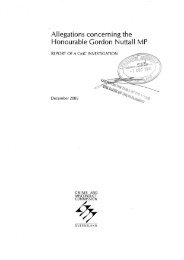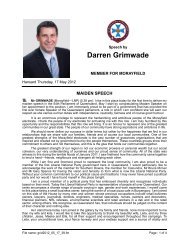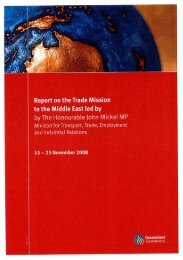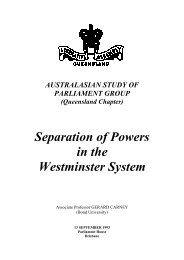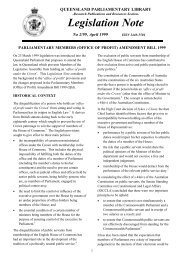CQUniversity Annual Report - Central Queensland University
CQUniversity Annual Report - Central Queensland University
CQUniversity Annual Report - Central Queensland University
You also want an ePaper? Increase the reach of your titles
YUMPU automatically turns print PDFs into web optimized ePapers that Google loves.
<strong>CQ<strong>University</strong></strong> ANNUAL REPORT 2012<br />
The Industry, Vocational Training and Access Education Division has<br />
actively promoted the <strong>University</strong>’s research agenda in 2012 and proudly<br />
launched the Inaugural Dual Sector Research Symposium in November.<br />
This two-day event was attended by over seventy delegates from<br />
<strong>CQ<strong>University</strong></strong> and CQ TAFE staff and external stakeholders from local<br />
businesses and industry who engaged with and informed the development<br />
of a Dual Sector Research Framework for the <strong>University</strong>.<br />
In addition, the Academic Learning Services Unit (ALSU) has provided<br />
15 places for their staff on a purpose-built research program – the<br />
Scholarship of Teaching Research Program: Introduction to researching<br />
your own teaching. The program aims to encourage and support the<br />
research activity of the ALSU academic teaching staff. The scholarship<br />
was launched in October and will support participants to develop their<br />
research in 2013.<br />
The Health Collaborative Research Network (CRN) was established<br />
in 2011 with Commonwealth and <strong>University</strong> funding to develop<br />
collaborative research partnerships between <strong>CQ<strong>University</strong></strong>, the<br />
<strong>University</strong> of <strong>Queensland</strong>, the <strong>Queensland</strong> <strong>University</strong> of Technology<br />
and Curtin <strong>University</strong>. The Health CRN aims to develop synergistic<br />
research relationships with larger metropolitan universities to provide<br />
<strong>CQ<strong>University</strong></strong> researchers access to larger facilities while providing<br />
metropolitan researchers better access to health networks on the<br />
ground in rural and regional communities. Under the auspices of the<br />
Health CRN, <strong>CQ<strong>University</strong></strong> has now hired four new Research Professors<br />
in targeted areas of Health and increased the leadership development<br />
capabilities across a range of disciplines. The Health CRN has also<br />
established a CRN Mentor Program to support the Early Career<br />
Researchers and provide professional development opportunities.<br />
The Office of Indigenous Engagement has worked with the Health<br />
CRN and other <strong>CQ<strong>University</strong></strong> directorates to ensure that research<br />
opportunities are inclusive of Aboriginal and Torres Strait Islander<br />
people. This has resulted in the Health CRN engaging an Early Career<br />
Researcher who identifi es as Aboriginal, and collaborative work<br />
being developed and implemented between the Offi ce of Indigenous<br />
Engagement and the Allied Health Clinic.<br />
Additionally, the Office of Indigenous Engagement has hosted a series<br />
of research seminars in 2012 that showcase the work of researchers<br />
who identify as Aboriginal or Torres Strait Islander people. These are<br />
open to the public and have been well attended by a broad cross section<br />
of university staff, external stakeholders and members of the public.<br />
RESEARCH INSTITUTES AND FLAGSHIPS<br />
<strong>CQ<strong>University</strong></strong>’s diverse research areas are embedded within a<br />
framework of research institutes and centres.<br />
The Appleton Institute is a multidisciplinary research hub based<br />
in Adelaide, combining excellence in research, teaching and<br />
community engagement across a range of scientifi c areas<br />
including sleep and biological rhythms, applied psychology,<br />
occupational health and safety, human factors, risk<br />
management and cultural anthropology.<br />
In 2012, the Education Flagship, encompassing both the IERC<br />
and LTERC, was strategically positioned within the fi eld of<br />
education research at <strong>CQ<strong>University</strong></strong>. The Flagship provides<br />
multidisciplinary research capabilities and expertise in ethically<br />
responsible, socially and culturally inclusive investigations<br />
into learning and teaching. LTERC is now at the cutting-edge<br />
of innovation using state-of-the-art visual tracking systems to<br />
undertake new research, leading to Australia’s initial eye tracking<br />
research methodology conference Eye Track Australia 2012.<br />
The Institute for Resource Industries and Sustainability (IRIS)<br />
provides multidisciplinary capabilities and expertise specifi cally<br />
structured to meet the needs of the Australian business sector.<br />
Research undertaken within the IRIS group of centres is very<br />
diverse: non-invasive assessment in agriculture, marine biosecurity,<br />
precision livestock management, ecological security laboratory and<br />
applied economics are some examples of the relevant and valuable<br />
research currently underway.<br />
The Institute for Health and Social Science Research provides a focus<br />
for multidisciplinary research that addresses the real needs of the<br />
communities in which it operates, and informs the undergraduate and<br />
postgraduate curriculum of <strong>CQ<strong>University</strong></strong>. The primary focus of this<br />
research is on informing, monitoring and evaluating programs, and<br />
interventions and behavioural changes that promote healthy, safe and<br />
viable communities.<br />
The <strong>Central</strong> <strong>Queensland</strong> Innovation and Research Precinct (CQIRP),<br />
purchased in 2011, has continued to grow as researchers occupy<br />
the laboratories and offi ce space. The research hub is expected to<br />
become a major regional research facility for research innovation in<br />
<strong>Central</strong> <strong>Queensland</strong>.<br />
29<br />
REVIEW OF OUR ACTIVITIES


